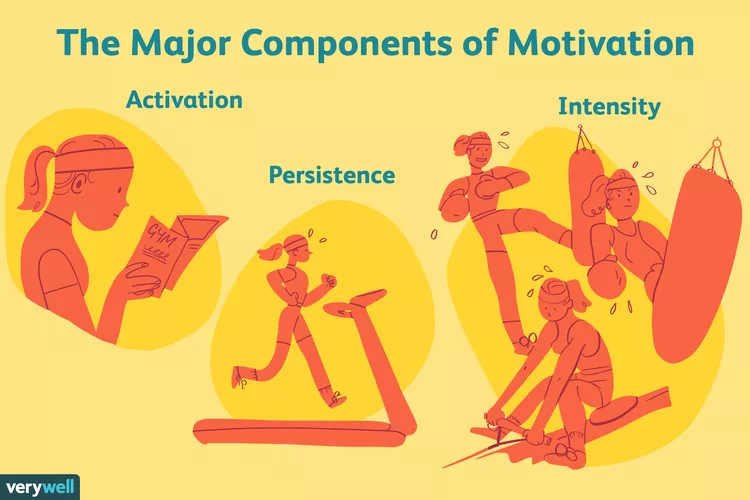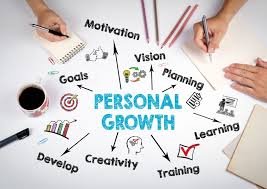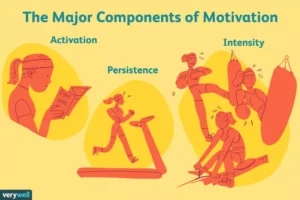What is it that inspires us to chase after our goals and push through obstacles? Motivation is the psychological force that explains why a person does something. It is the driving force behind human actions.
For instance, motivation is what helps you stick to a fitness routine or go after that promotion at work. In short, motivation causes you to act in a way that gets you closer to your goals. This drive includes the, and forces that activate human behavior.
Motivation also involves factors that direct and maintain goal-directed actions. However, such motives are rarely directly observable. As a result, we must often infer the reasons why people do the things that they do based on observable behaviors.
Why Motivation Is Important
Motivation serves as a guiding force for all human behavior. So, understanding how motivation works and the factors that may impact it can be important for several reasons.
Understanding motivation can:
- Increase your efficiency as you
- Drive you to take action
- Encourage you to engage in health-oriented behaviors
- Help you avoid unhealthy or maladaptive behaviors, such
- Help you of your life
- Improve your overall well-being and happiness
What Are the Types of Motivation?
Motivation isn’t one-size-fits-all. People are driven by different things depending on the situation, their goals, and their personality. Psychologists typically categorize motivation into
- arises from outside of the individual and often involves external rewards such as trophies, money, social recognition, or praise.
- is internal and arises from within the individual. For example, one might do a complicated crossword puzzle purely for the gratification of solving a problem
3 Key Components of Motivation
If you’ve ever had a goal (like losing 20 pounds or running a marathon), you probably already know that simply having the desire to accomplish these things is not enough. You must also be able to persist through obstacles and have the endurance to keep going in spite of difficulties.
These different elements or components are needed to get and stay motivated. Researchers have identified three major components of motivation: activation, persistence, and intensity.3
Activation is the decision to initiate a behavior. For example, enrolling in psychology courses to earn a degree is activation.
Persistence is the continued effort toward a goal even though obstacles may exist. An example of persistence would be showing up for your psychology class even though you are tired from staying up late the night before.
Intensity is the concentration and vigor required to pursue a goal. For example, one student might coast by without much effort (minimal intensity) while another studies regularly, participates in classroom discussions, and takes advantage of research opportunities outside of class (greater intensity).
The degree of each of these components of motivation can impact whether you achieve your goal. Strong activation, for example, means that you are more likely to start pursuing a goal. Persistence and intensity will determine if you keep working toward that goal and how much effort you devote to reaching it.
Tips for Improving Your Motivation
Everyone experiences fluctuations in their motivation and willpower. Sometimes you feel fired up and highly driven to reach your goals. Other times, you might feel listless or unsure of what you want or how to achieve it.
If you’re feeling low on motivation, there are steps you can take to help increase your drive. Some things you can do to develop or improve your motivation include:
Adjust your goals to focus on things that really matter to you. Focusing on things that are highly important to you will help push you through your challenges more than goals based on things that are low in importance.
If you’re tackling something that feels too big or too overwhelming, break it up into smaller, more manageable steps. Then, set your sights on achieving only the first step. Instead of trying to lose 50 pounds, for example, break this goal down into five-pound increments.
Improve your confidence. Research suggests that there is a connection between confidence and motivation.4 So, gaining more confidence in yourself and your skills can impact your ability to achieve your goals.
Remind yourself about what you’ve achieved in the past and where your strengths lie. This helps keep self-doubts from limiting your motivation.
If there are things you feel insecure about, try working on making improvements in those areas so you feel more skilled and capable.
What Causes Low Motivation?
We all experience dips in motivation from time to time. It’s normal and often happens during times when we are stressed, anxious, or struggling with problems like poor sleep or relationship conflicts.
There are a few things you should watch for that might hurt or inhibit your motivation levels. These include:
All-or-nothing thinking: If you think that you must be absolutely perfect when trying to reach your goal or there is no point in trying, one small slip-up or relapse can zap your motivation to keep pushing forward.
Believing in quick fixes: It’s easy to feel unmotivated if you can’t reach your goal immediately, but achieving goals often takes time.
Thinking that one size fits all: Just because an approach or method worked for someone else does not mean that it will work for you. If you don’t feel motivated to pursue your goals, look for other things that will work better for you.
Motivation and Mental Health
Sometimes, a persistent lack of motivation is tied to a mental health condition such as depression.5 Talk to your doctor if you are feeling symptoms of apathy and low mood that last longer than two weeks.
Theories of Motivation
Throughout history, psychologists have proposed different theories to explain what motivates human behavior. The following are some of the major theories of motivation.
Instincts
The instinct theory of motivation suggests that behaviors are motivated by instincts, which are fixed and inborn patterns of behavior.3 Psychologists such as William James, Sigmund Freud, and William McDougal have proposed several basic human drives that motivate behavior. These include biological instincts that are important for an organism’s survival, such as fear, cleanliness, and love.
Drives and Needs
Many behaviors such as eating, drinking, and sleeping are motivated by biology. We have a biological need for food, water, and sleep. Therefore, we are motivated to eat, drink, and sleep. The drive reduction theory of motivation suggests that people have these basic biological drives, and our behaviors are motivated by the need to fulfill these drives.6
Abraham Maslow’s hierarchy of needs is another motivation theory based on the desire to fulfill basic physiological needs. Once those needs are met, the hierarchy expands to include other needs, such as those related to safety and security, social needs, self-esteem, and self-actualization.
Arousal Levels
The arousal theory of motivation suggests that people are motivated to engage in behaviors that help them maintain their optimal level of arousal.3 A person with low arousal needs might pursue relaxing activities such as reading a book. In contrast, those with high arousal needs might be motivated to engage in exciting, thrill-seeking behaviors such as motorcycle racing.
The Bottom Line
Psychologists have proposed many different theories of motivation. The reality is that there are numerous different forces that guide and direct our motivations.
Takeaways
Understanding motivation is important in many areas of life beyond psychology, from parenting to the workplace. You may want to set the best goals and establish the right reward systems to motivate others as well as to increase your own motivation.
Knowledge of motivating factors (and how to manipulate them) is used in marketing and other aspects of industrial psychology. It’s an area where there are many myths, and everyone can benefit from knowing what works with motivation and what doesn’t.








